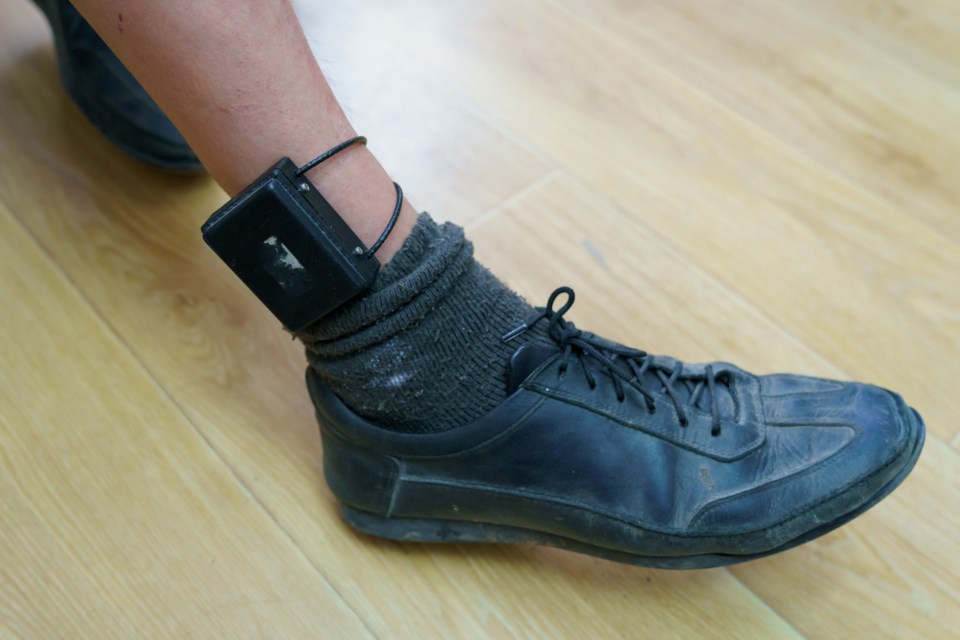Some British Columbians better be home for Christmas.
Specifically, those under a judge’s house arrest, curfew or probation order.
To enforce those orders, B.C. Corrections runs an electronic monitoring program, but it is not foolproof. Devices were removed without authorization 201 times between April 1, 2021 and Nov. 8, 2023, according to figures released by the Ministry of Public Safety and Solicitor General under the freedom of information law.
From January to October of this year, a daily average 339 B.C. Corrections clients were on court-ordered electronic supervision, up from 305 in 2022 and almost 36 percent greater than 2021’s 250.
B.C. was the first province to begin such a program in 1987 as a low-cost alternative to jailing low-risk offenders.
In October, based on the average daily count by community office, an average 288.8 clients were monitored, including 245.9 on bail orders, 37.9 on conditional sentence orders and five on probation. B.C. Corrections’ Fraser Metro region, which includes Delta, Surrey, Langley, Maple Ridge and the Tri-Cities, accounted for more than a third of all clients monitored. Only eight percent of clients monitored were in the Vancouver region, stretching from New Westminster to Squamish and Sechelt.
One client in the province, connected to the Surrey North community corrections office, was monitored due to high-risk offender designation.
The ministry said that the B.C. Corrections Central Monitoring Unit (CMU) operates around the clock and staff are alerted when an individual violates a condition, the battery is at risk of running out or if the electronic supervision anklet is tampered with or removed.
“Upon receiving an alert, CMU staff investigate to substantiate whether a breach has occurred and notify probation and police as appropriate,” the ministry said in the FOI response. “A breach of court-ordered conditions can result in charges and possibly time in custody, at the discretion of the courts.”
The statistics do not include Randall Hopley, who went missing from a Downtown Eastside halfway house for 10 days in November after Vancouver police found his cut-off anklet in a Mount Pleasant alley. Hopley served six years in federal prison for abducting a boy in Sparwood in 2011 and was already accused last January of violating his 10-year federal supervision order. Hopley is in custody and scheduled to make another court appearance Friday.
In 2022, B.C. Corrections contracted an electronic monitoring company from Hertfordshire, England. Public Accounts show $1.2 million spent last year with Buddi Ltd. in the first year of a three-year subscription agreement, which includes a three-year option to renew.
The contract said Buddi was hired to provide a “scalable electronic supervision solution, capable of enabling the province through users to electronically supervise all clients under different time and geographic area restrictions at the time located anywhere in B.C. where cellular or landline telecommunications service coverage is available.”
Buddi markets the one-piece Smart Tag, described in its promotional material as “the smallest, lightest available tag, with the longest battery life in the market, is charged wirelessly and is fully waterproof.”
The contract said the Smart Tag requires a strap, on-body charger, charging dock for the on-body charger and two single-use, disposable locking plates. Buddi is responsible for the cost of repair and replacement due to any normal wear and tear or defects or faults in its equipment, whether new or refurbished. Buddi agreed to provide the devices, compatible radio frequency units for each device, battery chargers, cables, tools, batteries and spares, including straps.
The maximum amount of Buddi’s contract in the second and third years is $750,000 each. B.C. is charged a daily $8.20 fee for each activated device, but if any are lost or damaged, replacement costs run from $220 to $1,400 each, depending on the component.
Standard strap sizes range from 19 to 40.5 centimetres, but 25 per cent of clients require a 23 cm strap and 20 per cent need 24 cm.
The contract includes ongoing training, customer support, maintenance and system support and updated or revised geospatial data configuring and loading. Amazon Web Services is the hosting subcontractor, with data centres in Toronto and Montreal.





